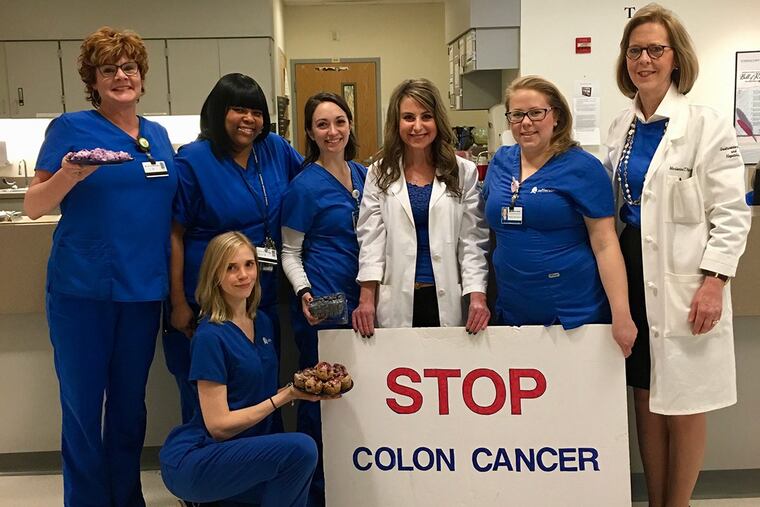What can I do to reduce my risk of colorectal cancer?
It is important to know your family history. Another preventative measure: Eat healthy. A diet high in fiber and low in saturated fats can help keep your colon happy and healthy.

You might notice that Philadelphia's skyline is blue this week. What you might not know is that it's lit up for Colorectal Cancer Awareness Month.
Why? Because awareness promotes prevention and possibly early detection.
Dr. Marianne Ritchie, a gastroenterologist with Thomas Jefferson University, has organized the Blue Lights Campaign for the last five years. Her hope: If people are surrounded by blue, they will feel the urgency of the message to get screened. Colorectal cancer is preventable, yet one-third Americans over 50 are not being tested.
Moreover, in recent years, there been a growing number of colorectal cancers (CRC) diagnosed for people under 50.
Take Nickcole Groves as an example.
When Groves was 37, she came to Jefferson after experiencing gastrointestinal symptoms of heartburn, stomach aches and bloating. Her doctor advised her to get a colonoscopy after she said she had a family history of pancreatic cancer. Much to her surprise, she had a large precancerous polyp. Groves is thankful she got screened as the outcome could have been worse had she waited.
It is important to know your family history. Dr. Ritchie advises her patients to begin screening at an earlier age if a close relative has had CRC or colon polyps.
Another preventative measure you can take to reduce your risk of CRC: Eat healthy. A diet high in fiber and low in saturated fats can help keep your colon happy and healthy. Follow these tips:
Limit beef and processed meats
Sorry, a prime rib steak or a salami sandwich don't mix well with prevention. According to a 2014 study in Gastroenterology, for every 3.5 ounces of high-fat red meat eaten per day, the risk of CRC rises by 14 percent. Choose leaner cuts of meat, like filet or sirloin or unprocessed turkey lunch meat, better yet, choose salmon and tuna, both full of healthy omega-3's fats. Consuming these fats for at least 10 years has been associated with a lower risk of developing colorectal cancer.
Add color and fiber to your diet from whole fruits and vegetables
Consume five to nine servings of whole fruits and vegetables a day (fresh or frozen). They contain potential cancer fighting compounds such as fiber, folate, B vitamins, minerals and antioxidants (beta carotene, vitamin E, and vitamin C).
Adding an additional 10 grams of dietary fiber per day can decrease colorectal cancer by 10 percent. Don't depend on supplements — benefits come from food – not pills! Top your yogurt in the morning with berries, blend some spinach in your smoothie, and steam fresh carrots and broccoli as a side for dinner. (Below, find two recipes to help you incorporate more fruits into your diet.)
Take vitamin D
There are some studies that support the potential preventive effects of vitamin D against colorectal cancer development. Since Vitamin D is only found in a few foods, such as cod liver oil, salmon, mackerel and sardines, it can be hard to fulfill the recommended daily intake. Take a supplement of 400-800 IU of vitamin D3 every day.
Eat fermented foods and probiotics
Fermented dairy products, such as yogurt and kefir, may protect against colorectal cancer. Fermented foods produce digestive-friendly enzymes, good bacteria and nutrients. Try incorporating sauerkraut, kimchi (pickled vegetables), or kombucha (fermented black or green tea) into your diet. Since we don't know the exact amount of good bacteria we are getting in these foods, it would be beneficial to add a probiotic supplement too.
Alcohol
There are always new studies on the positive and negatives of drinking alcohol. According to the latest American Cancer Society recommendations, heavy alcohol use of more than two drinks a day for men and one drink a day for women could increase the risk of colorectal cancer.
Emily Rubin RD, LDN is a registered dietitian at Thomas Jefferson University's Division of Gastroenterology and Hepatology. She is also the main dietitian at Jefferson's Celiac Center, Fatty Liver Center, and Weight Management Center.
Antioxidant Rich Blueberry Glazed Biscuits (Makes 12)
Ingredients
2 1⁄4 cups whole grain waffle or pancake mix

Courtesy of Emily Rubin Blueberry glazed biscuits, pictured at left, and frozen yogurt covered blueberry clusters, pictured at right.¾ cup quick oats
¼ cup truvia brown sugar blend
1 ¼ cup blueberries (fresh or frozen)
1 ¼ cup skim milk
½ cup blueberries
1⁄2 cup confections sugar
Directions
In a larger bowl, mix blueberries, sugar blend, milk, and oats and whole grain waffle or pancake mix and stir
Scoop mixture into individual muffin cups.
Glaze: blend blueberries with powdered sugar and spread on top each muffin – you will have extra you can add more after it is baked.
Bake 400 degrees for 12-14 minutes or until edges are browning.
Nutrition facts: 180 calories, 3g fat, 6g fiber
Frozen Yogurt covered Blueberry Clusters (Makes 20-30)
Ingredients
2 cup blueberries (fresh or frozen)
12 oz. vanilla Greek yogurt
Directions
Mix ingredients and scoop in to ice cube container and freeze 1-2 hours. – can add tooth picks.
When ready to eat , let sit out for 10 minutes
Nutrition facts: 10 calories per serving